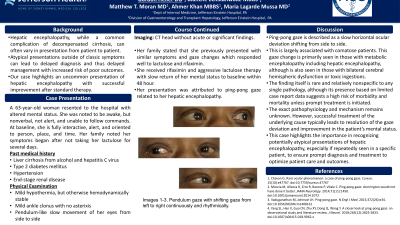Monday Poster Session
Category: Liver
P3054 - Ping-Pong Gaze as an Atypical Presentation of Hepatic Encephalopathy: A Case Report
Monday, October 28, 2024
10:30 AM - 4:00 PM ET
Location: Exhibit Hall E

Has Audio
- GH
Gordon Heller, DO
Albert Einstein Medical Center
Philadelphia, PA
Presenting Author(s)
Gordon Heller, DO1, Blanche Echikunwoke, MBBS1, Matthew T. Moran, MD2, Ahmer Khan, MBBS2, Maria Lagarde Mussa, MD3
1Albert Einstein Medical Center, Philadelphia, PA; 2Einstein Healthcare Network, Philadelphia, PA; 3Einstein Medical Center, Philadelphia, PA
Introduction: Hepatic encephalopathy, while a common complication of decompensated cirrhosis, can often vary in presentation from patient to patient. Atypical presentations outside of classic symptoms can lead to delayed diagnosis and thus delayed management with increased risk of poor outcomes. Our case highlights an uncommon presentation of hepatic encephalopathy with successful improvement after standard therapy.
Case Description/Methods: A 63-year-old woman with history of liver cirrhosis from alcohol and hepatitis C virus, diabetes, hypertension, and end-stage renal disease presented to the hospital with altered mental status. She was noted to be awake, but nonverbal, not alert, and unable to follow commands. At baseline, she is fully interactive, alert, and oriented to person, place, and time. Her family noted her symptoms began after not taking her lactulose for several days. Her exam was notable for mild ankle clonus with no asterixis as well as a pendulum-like slow movement of her eyes from side to side. She was mildly hypothermic, but otherwise hemodynamically stable. CT head imaging did not show acute or significant findings. Her family stated that she previously presented with similar symptoms and gaze changes which responded well to lactulose and rifaximin. She received rifaximin and aggressive lactulose therapy with slow return of her mental status to baseline within 48 hour. Her presentation was attributed to ping-pong gaze related to her hepatic encephalopathy.
Discussion: Ping-pong gaze is described as a slow horizontal ocular deviation shifting from side to side. This is largely associated with comatose patients. This gaze change is primarily seen in those with metabolic encephalopathy including hepatic encephalopathy, although is also seen in those with bilateral cerebral hemispheric dysfunction or toxic ingestions. The finding itself is rare and relatively nonspecific to any single pathology, although its presence based on limited case report data suggests a high risk of morbidity and mortality unless prompt treatment is initiated. The exact pathophysiology and mechanism remains unknown. However, successful treatment of the underlying cause typically leads to resolution of the gaze deviation and improvement in the patient’s mental status. This case highlights the importance in recognizing potentially atypical presentations of hepatic encephalopathy, especially if repeatedly seen in a specific patient, to ensure prompt diagnosis and treatment to optimize patient care and outcomes.
Disclosures:
Gordon Heller, DO1, Blanche Echikunwoke, MBBS1, Matthew T. Moran, MD2, Ahmer Khan, MBBS2, Maria Lagarde Mussa, MD3. P3054 - Ping-Pong Gaze as an Atypical Presentation of Hepatic Encephalopathy: A Case Report, ACG 2024 Annual Scientific Meeting Abstracts. Philadelphia, PA: American College of Gastroenterology.
1Albert Einstein Medical Center, Philadelphia, PA; 2Einstein Healthcare Network, Philadelphia, PA; 3Einstein Medical Center, Philadelphia, PA
Introduction: Hepatic encephalopathy, while a common complication of decompensated cirrhosis, can often vary in presentation from patient to patient. Atypical presentations outside of classic symptoms can lead to delayed diagnosis and thus delayed management with increased risk of poor outcomes. Our case highlights an uncommon presentation of hepatic encephalopathy with successful improvement after standard therapy.
Case Description/Methods: A 63-year-old woman with history of liver cirrhosis from alcohol and hepatitis C virus, diabetes, hypertension, and end-stage renal disease presented to the hospital with altered mental status. She was noted to be awake, but nonverbal, not alert, and unable to follow commands. At baseline, she is fully interactive, alert, and oriented to person, place, and time. Her family noted her symptoms began after not taking her lactulose for several days. Her exam was notable for mild ankle clonus with no asterixis as well as a pendulum-like slow movement of her eyes from side to side. She was mildly hypothermic, but otherwise hemodynamically stable. CT head imaging did not show acute or significant findings. Her family stated that she previously presented with similar symptoms and gaze changes which responded well to lactulose and rifaximin. She received rifaximin and aggressive lactulose therapy with slow return of her mental status to baseline within 48 hour. Her presentation was attributed to ping-pong gaze related to her hepatic encephalopathy.
Discussion: Ping-pong gaze is described as a slow horizontal ocular deviation shifting from side to side. This is largely associated with comatose patients. This gaze change is primarily seen in those with metabolic encephalopathy including hepatic encephalopathy, although is also seen in those with bilateral cerebral hemispheric dysfunction or toxic ingestions. The finding itself is rare and relatively nonspecific to any single pathology, although its presence based on limited case report data suggests a high risk of morbidity and mortality unless prompt treatment is initiated. The exact pathophysiology and mechanism remains unknown. However, successful treatment of the underlying cause typically leads to resolution of the gaze deviation and improvement in the patient’s mental status. This case highlights the importance in recognizing potentially atypical presentations of hepatic encephalopathy, especially if repeatedly seen in a specific patient, to ensure prompt diagnosis and treatment to optimize patient care and outcomes.
Disclosures:
Gordon Heller indicated no relevant financial relationships.
Blanche Echikunwoke indicated no relevant financial relationships.
Matthew Moran indicated no relevant financial relationships.
Ahmer Khan indicated no relevant financial relationships.
Maria Lagarde Mussa indicated no relevant financial relationships.
Gordon Heller, DO1, Blanche Echikunwoke, MBBS1, Matthew T. Moran, MD2, Ahmer Khan, MBBS2, Maria Lagarde Mussa, MD3. P3054 - Ping-Pong Gaze as an Atypical Presentation of Hepatic Encephalopathy: A Case Report, ACG 2024 Annual Scientific Meeting Abstracts. Philadelphia, PA: American College of Gastroenterology.
